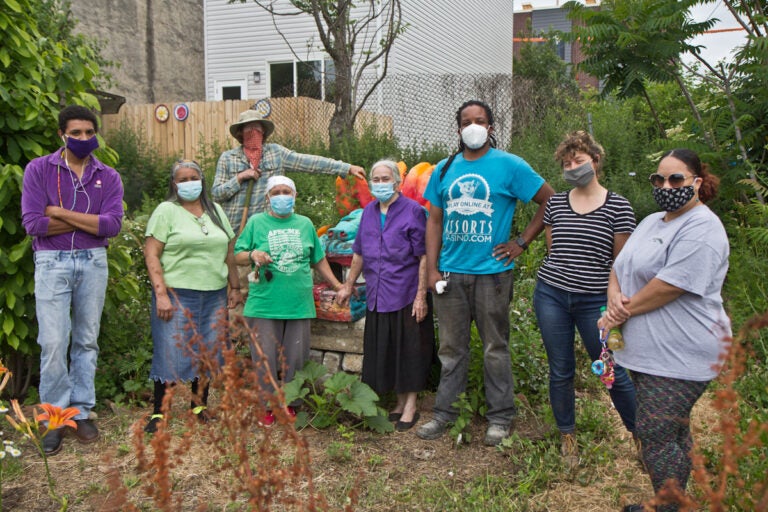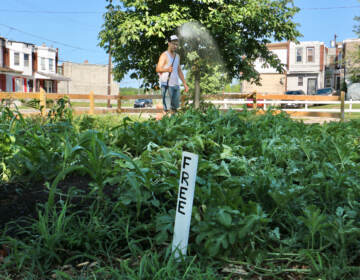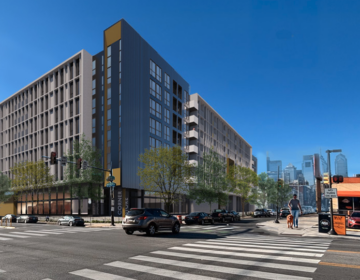South Kensington gardeners challenge housing project — and win a conversation
Asociación Puertorriqueños en Marcha is partnering with Scannapieco Development Corporation on the mixed-income development.

Gardeners (from left) Josh Reaves, Mirta Gonzalez, Sara Vega, Willow Zef, Morgana Ginet, Anthony Batrick, Lauren Troop and Ada Marie Biaz at the César Andreu Iglesias Community Garden in Kensington. (Kimberly Paynter/WHYY)
South Kensington residents halted an attempt to rezone empty lots, currently being used as gardens, for housing and to increase density in the formerly industrial area now home to a growing residential population.
The effort to rezone the block of North American Street, and create two zoning overlays that would allow for a mixed-income housing development, was put on hold after longtime residents and members of a community garden said they had no input on the process. It will proceed after a community engagement process.
Councilwoman María Quiñones-Sánchez, who introduced the two City Council remapping bills, recognized the lack of a public engagement process at a hearing before the council’s Committee of Rules on Wednesday, attributing it to the coronavirus pandemic. But she said bringing the bills to council before the process could happen was the only way to guarantee affordable housing in her district, which is seeing growing pressure from developers trying to build there before the 10-year tax abatement is reduced.
“Pre-COVID and then post-COVID, the world has changed. How we do public engagement is complex, but we’re committed to a process,” said Quiñones-Sánchez. “But with the potential for thousands of new units coming to the 7th councilmanic district, I feel compelled to put together and propose what is the most aggressive, most aggressive mandatory affordable requirement that we have on the books in the city of Philadelphia.”
The rezoning would enable development built by Asociación Puertorriqueños en Marcha, or APM, in partnership with Scannapieco Development Corporation, known for its luxury condo buildings in the city. One of the projects — a 200-feet-high building on the block bounded by Norris Street, American Street, Berks Street, and 3rd Street — will require 20% of affordable units. The other, about 40 rowhomes to go up on vacant lots currently in Land Bank control, requires that 51% of the units be sold to persons earning between 61 and 120% of area median income.
Some longtime residents of the mostly working-class Puerto Rican and African American neighborhood have opposed the project since they found out about it three months ago, when the Land Bank was ready to lease those lots to APM.
Neighbors who had been using those vacant lots as gardens and patios for decades cried foul when the city took steps to seize the land without a public process. Which is why, in March, the Land Bank board decided to postpone the decision of putting the lots in the hands of APM, until proper community engagement had happened.
Then COVID-19 struck and the community meetings never happened. This week, members of the César Andreu Iglesias Community Garden heard about the two bills going before the city’s Planning Commission on Tuesday, and City Council on Wednesday.
“You need to start worrying about the people who live in this neighborhood, not the people who come from out of town to live in the neighborhood because it’s the hot spot to be in,” said Anthony Patrick, a member of the garden who has lived in the neighborhood his whole life, Tuesday at the Planning Commission hearing.
Patrick argued that allowing condos on the North American corridor does not benefit a community that desperately needs more jobs, not higher-rent living options. He said that the affordable units proposed are not accessible for those who live in the area now.
“Y’all need to create jobs here. Y’all need to make sure that it’s affordable housing around here,” he said.
After an hour of discussion, the commissioners unanimously decided to delay the approval of the bills for 45 days, to allow for further community engagement. They said changing the zoning of a corridor for one particular development seemed problematic, and that the project lacked specifications regarding its affordable housing component.
“To have a big building and call out a couple of places [for affordable rents] makes me nervous, because the people we see in a lot of neighborhoods that are changing are pretty much pushed out rather than included, folks who either have family who have lived there for years or want to stay there,” said Patrick J. Eiding, a member of the Planning Commission and president of the Philadelphia Council AFL-CIO.
On Wednesday, nevertheless, the City Council committee unanimously approved the amendments to the zoning map and moved the bills out of commission with a favorable recommendation to be read on next council session. The Land Bank’s executive director, Angel Rodríguez, committed to a community engagement process and to keep some of the vacant lots as gardens.
But the bills won’t be able to be voted on until September, according to director of Planning and Development Anne Fadullon, if the Planning Commission approves of the zoning change.

Subscribe to PlanPhilly
WHYY is your source for fact-based, in-depth journalism and information. As a nonprofit organization, we rely on financial support from readers like you. Please give today.







